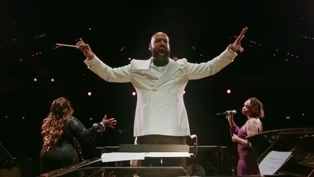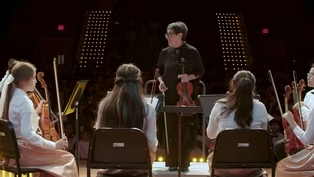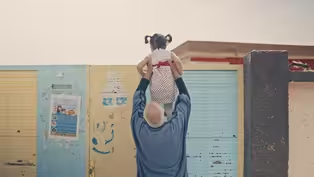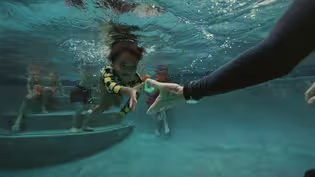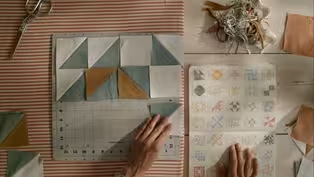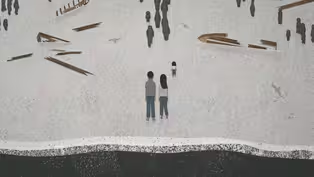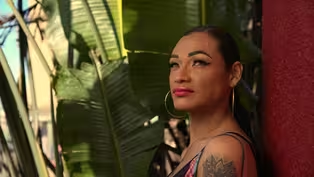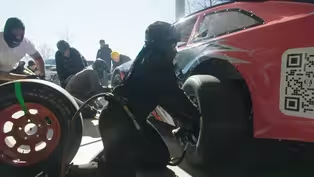
POV Shorts: Classroom 4
Season 38 Episode 806 | 38m 2sVideo has Closed Captions
A history professor teaches a class of free and incarcerated students inside a prison.
CLASSROOM 4 is the story of an award-winning professor teaching "The History of Crime and Punishment" inside a prison to a class of both free students and incarcerated students. Through exploring concepts including masculinity, prison abolition, and mercy, the work reveals the true cost of mass incarceration and the power of human connection to transform society.
Problems playing video? | Closed Captioning Feedback
Problems playing video? | Closed Captioning Feedback
Major funding for POV is provided by PBS, The John D. and Catherine T. MacArthur Foundation, the Wyncote Foundation, Reva & David Logan Foundation, the Open Society Foundations and the...

POV Shorts: Classroom 4
Season 38 Episode 806 | 38m 2sVideo has Closed Captions
CLASSROOM 4 is the story of an award-winning professor teaching "The History of Crime and Punishment" inside a prison to a class of both free students and incarcerated students. Through exploring concepts including masculinity, prison abolition, and mercy, the work reveals the true cost of mass incarceration and the power of human connection to transform society.
Problems playing video? | Closed Captioning Feedback
How to Watch POV
POV is available to stream on pbs.org and the free PBS App, available on iPhone, Apple TV, Android TV, Android smartphones, Amazon Fire TV, Amazon Fire Tablet, Roku, Samsung Smart TV, and Vizio.
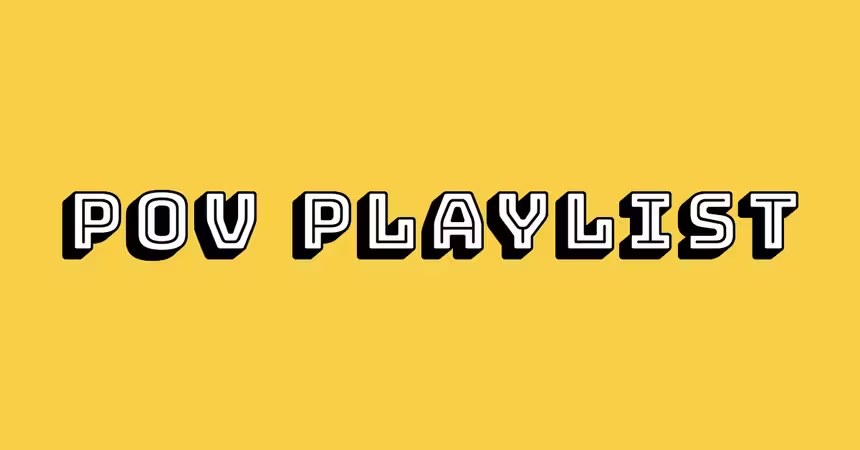
POV Playlist
Every two weeks, we curate a selection of POV docs, old and new, around a central theme. Stream while you can — until the next Playlist!Providing Support for PBS.org
Learn Moreabout PBS online sponsorshipMore from This Collection
The best and boldest independent short films, curated by America's longest-running documentary
POV Shorts: Songs of Black Folk
Video has Closed Captions
Leading Black musicians in the Pacific Northwest create new traditions on Juneteenth. (26m 55s)
Video has Closed Captions
A retired music teacher starts Georgia’s first youth orchestra for immigrant families. (22m 5s)
Video has Closed Captions
From big city to small town, two stories reflecting contemporary America. (25m 5s)
POV Shorts: The People Could Fly
Video has Closed Captions
A poetic look at roller rinks as sanctuaries for Black culture, joy, and resistance. (21m 48s)
Video has Closed Captions
Photographer James Balog brings the 15-year Extreme Ice Survey project to a close. (25m 5s)
Video has Audio Description
Ahmed must find a way to get his son’s remains back home to Morocco so he can say goodbye. (40m 19s)
Video has Audio Description
Kids learn to swim - and, in their lessons, we discover profound wisdom for all. (21m 9s)
Video has Audio Description
Two stories of quilted heirlooms and generational nostalgia. (24m 35s)
Video has Audio Description
Families traverse tradition and memory in marking new phases of life. (25m 5s)
Video has Audio Description
A portrait of the experiences unique to displaced queer people fleeing violence at home. (25m 5s)
Video has Audio Description
Two stories of women who trailblaze and persist. (24m 50s)
Video has Audio Description
Two stories excavating distinct portraits of place, politics, and economy. (25m)
Providing Support for PBS.org
Learn Moreabout PBS online sponsorship[ Mid-tempo music plays ] ♪♪ ♪♪ -Okay.
I've got all my handouts.
I've got name tags.
♪♪ I'm wearing a non-underwire bra, just in case.
[ Chuckles ] Okay.
You have to think really far ahead when you're going into a prison because you can't -- The things you can bring, things you can't bring.
We can't leave once we're there.
♪♪ [ Door closes ] ♪♪ So, there are 15 inside students and 15 outside students.
And I don't think they know what to expect.
And I think they're nervous.
Everybody's nervous.
♪♪ We're almost there.
♪♪ ♪♪ -[ Buzzer ] -Okay.
Pull.
How you doin'?
-[ Laughter ] -Very excited.
-Yeah.
Folks look wonderful from here!
[ Chatter ] -Five minutes till... -Visitors are warned that there are inherent safety and security risks in visiting a correctional facility, and the possibilities of personal assault or of being taken hostage do exist.
Do you understand?
-All: Yes.
-Yes.
Okay.
So I sign.
-Yeah.
There's a line.
-See you on the other side!
[ Chuckles ] [ Chatter ] -If you're ready, yeah, just go right on through.
Mr.
Hanley's in there on the other side.
-Yeah.
-Perfect.
[ Chatter ] -Hi, there.
Okay.
Alright.
Hello!
Find a seat.
[ Chatter ] And let's try to distribute the space a little bit so that people can hear each other.
No.
Are you -- Are you joining?
-Yeah.
-Okay.
So then you get... [ Chatter ] Alright.
So...welcome.
Let's take a breath.
-Hello.
-And I am going to begin a sentence, and you are going to finish it with your partner.
Each of you can take turns responding as you would like to respond.
Okay.
So you might be surprised to learn that I... You might be surprised to learn that I... [ Chatter ] -Sure.
-Yeah.
Yeah.
-You're a senior now?
Wow.
-Yeah.
-Wow!
-[ Laughs ] -Really?
-Oh, yeah.
-Outside circle, please stand up.
Thank your neighbor.
Do-si-do your partner.
We're gonna move over one more seat.
Up and over.
-Nice to meet you.
-Nice to meet you.
-The weirdest thing I've ever eaten is... The weirdest thing I've ever eaten is... The quality I value most in a friend is... My favorite toy, game, or book as a child was... -No way!
-Shh!
[ Chatter stops ] -Indeed.
[ Laughter ] Okay, we're about to move our chairs into a different configuration for one more ice-breaking activity.
I wonder if anyone would like to share right now how that felt.
-Still a little nervous, but... [ Laughter ] But also feeling like it's a total privilege to feel nervous about something that's so exciting like this.
So that's all.
-Right on.
Right on.
Nick?
-I feel...relieved.
I feel like this is... this is cool.
It was very -- At first, I was awkward, I was nervous.
Um, I wasn't sure what to expect, and so -- And I almost -- I felt like my guard was up a little bit.
But everybody that's in this inside circle has been extremely nice, and I've just felt... this is cool.
-Yeah.
-The nerves have disappeared.
-Hm!
-"Is it surprising that prisons resemble factories, schools, barracks, hospitals... ...which all resemble prisons?"
This is a quote from Michel Foucault.
For the next minute, just write down some reactions to that quote.
-Sorry.
-That's okay.
-However you want, right?
Full sentences, single words, stream of consciousness, circles and arrows.
-One time when I was in seventh grade, on the first day of school, my English class, we had a prompt about what school means to you, and I wrote, "Schools..." -- which I now don't know if I agree with this statement, but I was in seventh grade, so forgive me.
I said, "Schools are like prisons.
No one wants to be here, but we probably have them for a reason."
-Ooh.
Interesting.
Interesting.
James?
-Like, humans have always tried to put structure in things that are naturally chaotic, like a school, a hospital, barracks, especially prisons.
So I think that's an attempt to put discipline or structure in a environment, sort of an attempt to cage the beast, so to speak.
-EOCI, Eastern Oregon Correctional Institution out in Pendleton, is an old, uh, mental hospital that was converted into a prison, and Powder River is an old army barracks.
So it's basically they're just swapping one and the same.
-Mhm!
This is beautiful.
Incredible, incredible, incredible conversation, folks.
Incredible conversation.
So, one thing just to mention historically is a new fancy word called "modernity."
And these are all institutions that were born around the same time, right?
With the same language and assumptions of needing to create order out of chaos and to produce productive workers.
So you're reading Foucault for next week.
He opens the book with a scene in pre-modern France, 18-, 17th-century France.
Someone's being drawn and quartered.
It's an awful scene of torture.
And then he cuts to a schedule of bells and time, where you have to be, how you have to move.
These are two different forms of punishment.
And what he wants to look at is, how did one come to replace the other, right?
Because tearing someone apart with vultures and drawing and quartering them in a public square was as normal to the people who were living in that society as prison is now to ours.
In other words, you move from beheading someone to incarcerating them.
That was meant as a reform.
And so we're going to think about that transition.
[ Chatter ] [ Man on P.A.
speaking indistinctly ] -There's five units on top.
They all have bunk beds.
It's an open-dorm living situation.
We're gonna go all the way down to the very end.
-Okay.
-So, were you able to go up onto the units at all?
-No.
-We did not go in the... -And I think that's one of the problems with the tour, is that you're missing a very large picture of our day in and day out, um, you know, how close in proximity we are to one another, uh, just the living conditions in themselves.
-All our belongings are crammed in one little box.
All our belongings.
All our possessions.
And it's -- When I say a box, a box.
And it's, I think, in Oregon, it's like 72 people with three toilets to defecate in and two to pee in.
It's three telephones.
We have to split like -- Like Joey said, you have to scream, "Who got next?
Who got next?"
And then don't nobody hear you.
It's chaos.
-Yeah, with the prison tours, I think that I've learned most from actually talking with all of you guys than I would if I was just in a tour because even though I see what's happening, I don't know who you guys are.
I don't know your individual stories and your life experience.
So I can still be like, "Oh, I can see that guy," and like, picture a whole narrative, his whole life.
Doesn't have to be true.
And I leave this building without having any context of what has happened.
I can just imagine it.
-You don't get the full picture.
Whether you had a pamphlet of exactly what was being said and shown on the tour and everything to back it up will never, um, give a full perspective on the human, um, you know, feelings that are associated with it.
Uh, there's a great deal of, um, desensitization that comes with doing time.
I don't -- I can't tell you when the last time was that I made a phone call and wished anybody happy birthday.
Somebody said something today about it being Friday, and that means nothing to me because Friday is no different than Monday or Wednesday.
Every day is the same for me.
Um, I don't even -- I forget my own birthday in here.
-Using the prison-tourism article as a starting point, what are some of the codes among incarcerated people that we have not already discussed?
Why are they there?
How do you learn about them?
How are they enforced?
How do the ethics of prison differ from those in the outside world?
-Because you're either a fish or you're a shark.
Um, and when new people come in, that's one of the terminologies, is you call them -- They're fresh fish.
You know, who are they?
What are they about?
Yada, yada, yada.
How can we exploit that?
And if I can smell fear in him, I'm gonna take advantage of it.
-You know, I'm slung back with all my tattoos, right?
I'm -- If you take a look around at some of the other guys in here, I'm considered a smaller guy in the prison population, and I always have been.
At first, when I was younger, I was subject to, you know, like, the pecking order, getting picked on.
People kind of try to, you know, take advantage of me and push me around.
I had to really toughen up my whole persona.
I tattooed all this stuff on me so that I look, you know -- At first glance, I kind of look like, "Oh, God, this is a scary guy.
I don't want to mess with him."
-And, like, personally, I've been affected by that because some of my family members have been in a prisoner-of-war situation.
And it's like, you know... Your whole personality changes after that.
And when they talk about themselves, it's like "me before that and me after."
It's like these whole two different persons after that.
Yeah.
-So interesting.
-Because the course rests on this dialogue between incarcerated and free, we're creating this new form of knowledge.
And at the same time, we're collapsing the boundaries that we take for granted, and we're dissolving the fear that makes us believe that those walls are necessary in the first place.
-This is my fifth time in prison.
I've been to every correctional institution in Oregon except for one.
And everybody knows who I am when I walk through the door everywhere.
You know, I mean, I can trace back, you know, how I dress, how I look, tattoos I get, how I act, all that, to 12 years old.
Um, I shot my stepdad with his own gun, went to a Scared Straight program where they found out that I was in there for shooting my stepdad because he beat me and my mom for six and a half years.
-You know, when I first fell, I had no idea other than my family saying, "Hey, when you get in there, you make sure you you look up the Natives.
You find your people and you stick with them because those are who you need to be around."
[ Chatter ] [ Woman on P.A.
speaking indistinctly ] -How do you express yourself and your whole life in a constrained space?
How do you represent yourself when you only have a few tools?
What are the essential things you want people to know about you?
Six words.
-I suppose that one... -Okay.
Would anyone like to read theirs?
-Uh, sure.
-Uh, I kind of went with, like, the three stages of life.
Like, childhood, adolescence, adulthood.
-Nice.
-Um, the first two are childhood -- "kind" and "gentle."
The second two, adolescence -- "alone" and "imprisoned."
And the third is adulthood -- "numb" and "survival."
-Hm.
-Hm.
-Adopted, loved, sad, frustrated, college, happy.
[ Laughter ] -I mean, it's Bosnia, care, moving, better, confused, and work.
-Uh... mine is provider, father, loved, mama's boy, respected, and honest.
-Yes.
Yes.
-Alright, so we're just gonna spend a few more minutes, um, directly with this book, uh, focusing on the issue of juveniles.
One of the chapters -- I think it's chapter eight -- Stevenson discusses the concept of mitigating factors.
And this is something that you've all brought up indirectly, even if you didn't use that fancy word.
And considering those "mitigating factors" should, ideally, according to Stevenson, result in some mercy.
-When you're an adolescent, you are not even close to thinking like an adult would think, especially -- I think one of the cases was 13 years old.
That is so young -- And life in prison.
Um...but you can't even -- At 13, you can't fathom life in prison, first off.
As an adult, you can't fathom life in prison, so how do you expect a child to even be able to think along those lines, right?
And then the mitigating factors that go into all of that, when there's abuse, when there's sexual or physical abuse, when there's, uh, the neighborhood.
Like, all of that goes into play, and some people can't escape those things.
-Mm-hmm.
Why are you getting life in prison or the death penalty?
-Nick.
-Um... And to kind of go off of that, as well, I mean, you're in the moment right then and there as to whatever's going on in your life.
Your hormones are already out of whack, so you're just going to react.
And, unfortunately, that's what gets a lot of people into trouble.
-I just seen a picture my son showed me of me when I was little.
I was just thinking about -- It was a picture of me and my Raggedy Andy doll that I couldn't go to sleep without until I was like 12 or 13 and then going to jail at 14.
Like, where it go from being a kid to going to prison, like, the next year, so... -A really quick response to that is, um, one of the most -- Uh, just, this line hit me so hard.
It was, um, "Mercy is most powerful when it's given to the undeserving."
And it breaks the cycle of victimhood and victimization.
And it made me consider how I've received mercy in my life and how I give it to other people.
And that was just such a powerful line to me.
-Just something about the Ian case.
Yeah.
Ian spent 18 years in uninterrupted solitary confinement because he was a child and they didn't feel comfortable putting him into the greater population because they thought he may face abuse.
So they... -Abused him.
-...put him in solitary confinement for 18 years.
Um, and that was the state of Florida, which is where I'm from.
And at the end of that paragraph, it says, "Florida has the largest population in the world of children condemned to die in prison for non-homicides."
And, um...I don't know.
I've got a lot of love for my state, but it sucks to read [bleep] like that, to know that that's where you're from.
-Have you changed since you were 13?
And what would people miss if they froze you at that moment?
-"If I were frozen at 13, people would see a scared, angry little boy hiding in the corner, away from the hitting, the kicking, the screaming, and the crying, hiding in the closet away from the ones that said they loved us, from the ones that didn't know what love was.
They would see a kid desperately trying to be other than he thought and was terrified he would become, a boy that felt alone, stupid, afraid, and alone."
I guess I felt alone.
I put it twice.
Um, "A boy that didn't want to grow up to be violent, didn't want to grow up to be a sick [bleep] like the ones that raised him, a boy that simply didn't want to grow up.
They would miss out on the care, the love, and the truth that was that little boy."
-Thank you.
-Justin, are you ready?
-Yeah.
Uh... "If I would have been frozen at 13, the world would miss out on my children -- their potential, their beauty, their grace.
Along with that, the world would also miss out on a lot of pain.
The people I have victimized are not truly safe but are probably safer and less injured than they would be if they had never met me.
It is hard to fully grasp that and to completely accept the world might be better off without me, but there is some truth to that."
-Let's breathe.
I respect you all so much.
You're so -- so brave.
♪♪ ♪♪ I think I cry almost every single class.
Some of that is because people are expressing pain, but it's also because I'm so moved by the courage to be vulnerable.
People are more than the worst things they've ever done.
And no one is disposable.
♪♪ I think this course helps all the students to move beyond the myths and the stereotypes, looking each other in the eyes as equally worthy human beings.
And once I can create a space that allows that to happen, I can just get out of the way.
♪♪ [ Indistinct shouting ] ♪♪ -[ Singing in native language ] ♪♪ ♪♪ ♪♪ -Wow!
You blessed this place.
You've blessed this room.
-Thank you.
-Thank you so much.
-You're very welcome.
-[ Speaking indistinctly ] -What a gift.
What an honor.
And you've brought us into your lineage of struggle and joy and persistence.
And we're -- we're here with you and so honored.
Thank you.
So, we are going to start with connecting a little bit and say a few words about what you've experienced in the past two weeks during spring break that you feel would be useful for you or other people in the room to bring into the space.
-Today is my one-year anniversary of being at this facility.
So...happy anniversary... [ Laughter ] -Congratulations...?
[ Laughter ] -I -- As much as I despise the setting wholeheartedly, I do enjoy seeing everyone again.
-And the bravery that it takes to come in and sit here and talk with us has been astounding to me, but also crucial in my, like -- Like what Chop said, we're able to look forward to every Friday.
Like, I'm actively doing school for the first time in probably about 12 years, and I'm loving it.
And that's totally new for me.
Like, I don't do school.
I barely graduated high school.
Like, for me, that's super, uh -- super important.
-This class, even though we all, like, look forward to it and really value it, it is, like, very hard.
Like, the work that we're doing here is, like, oftentimes witnessing other people's pain and suffering that they're going through and, like, seeing each other, um, and, like, trying to reconcile that pain in sort of, like, the larger systems that we're looking at.
And that is something that is, like, very complex and takes a long period of time.
Like, we're taking a semester, but I know that, like, the things that I've heard and said in this class will last longer than a semester.
-You were saying you look forward to this class.
I, too, look forward to this class, but at the same time, I'm regretting it because I know it eventually will come to an end.
And that sucks because it's not very often that we get something in here that is extremely precious and something that I truly am grateful to have.
And... And, you know, in a few weeks, it's going to go away.
And that sucks.
And I don't like that part because it's just one more thing that, ohp, you don't have no more.
So that's -- that's my part of it.
I mean, I'm glad you're all here.
I really am.
And thank you very much.
But at the same time... -Some of you may have written papers for this week.
Um, if you did write a paper for this week or if you have a good handle on the material and you want to share what you wrote about, that would be a fine place to start.
Otherwise, discuss -- how did this book change your view, if it did, of what abolition is?
-The behavior of the lawbreakers over history has not changed drastically.
What has changed is precisely who is in power and how they're enforcing the laws that they want to write.
And I guess I'm saying that in response to what you're saying.
-I came to this work because, as a historian, I don't take our current world as natural or inevitable, but as the result of human decisions.
So the course helps students to understand how the world we live in came to be and how we're living now in the legacy of that past.
[ Chatter ] Okay, in the remaining couple minutes, think about how you might want to summarize your conversation.
[ Chatter ] -I think one of the interesting things I've noticed about this class, I feel like I came in and I thought a lot of the inside students would be like, "[Bleep] prison.
Like, this place is terrible."
Like, in all ways, shapes, and form.
And I feel like it's so interesting because, in our group, it seems like the outside students are the ones that are like, "Abolish all prisons.
Abolish this whole system."
And a lot of the inside students are like, "There are people that deserve to be here.
We can't get rid of prison."
-Relationally, emotionally, mentally, socially, somehow we're all broken, or we wouldn't be here.
We wouldn't do the things that we do to get ourselves in these positions and put ourselves in these places.
Um... And if you fix the people, then the prison wouldn't be needed anyway.
-I totally understand the point that you're making, but rather than, like, the micro perspective, being, like, the individual person that you say needs fixing, and the macro, looking at, um, the way that we respond to societal needs, um, that -- and those, When those societal needs are not met can create instability in a person that is then exploited and lands them in jail.
-I can do prison very well.
What I can't do is live in society without using drugs and committing crime to support my habits.
I don't know how to live out on the street.
I don't know how to be a normal person out there.
And that today is still one of my biggest fears.
I've asked myself why that is.
Why can I work so well in here, but not out there?
And in here, I do better with structure.
The minute that gate opens and I'm out there and something goes wrong or I fall back into my old ways and I start using drugs, it's all gas, no brakes.
-Mm-hmm.
-I don't really care about consequences because at that point it's too late.
-I am also a heroin addict, and, like, you don't need to be in prison to stay sober.
That's not -- That's not real.
Um, and I don't say that to invalidate you.
I say that because there's such a better [bleep] option, and it's infuriating that instead we're imprisoning people who don't need to be imprisoned.
So much crime is financial crime, is crime of poverty, but they need [bleep] social services, like, treatment for drug addiction and access to education and housing and health care that meets their needs.
-I want to just remind us as our closing, that Mariame Kaba, who's a great abolitionist, always says that abolition is about building things.
It's about making things.
It's not just about destroying things.
So as we go around, please say, one word, what will you build?
-Compassion.
-Family.
-Schools.
-Hope.
-I would have to agree with family.
-Durability.
-Empathy.
-Resilience.
-A bridge.
-Courage.
Otherwise worlds.
-Hm.
-A chance.
-Fellowship.
-Understanding.
-Respect.
-Love.
[ Birds chirping ] [ Chatter ] -Okay.
I'll see you there.
[ Buzzer ] [ Click ] [ Chatter ] [ Woman on P.A.
speaking indistinctly ] -Was so excited to come into this class, especially because of my, like, minute amount of time in jail.
Um, I just felt connected to all of you already because I have this history of addiction and I've struggled in that way, and it's been so rewarding to not only be able to share that part of myself openly, and I don't usually get to.
Like, not everyone wants to hear that you used to, like, sleep in your car and do heroin.
Um, I have just learned so much more from all of you than I could ever give.
And, um, I'm grateful for it.
And that's all I have.
Thank you.
-I'll start off by saying, uh -- telling everybody in this class thank you.
Um, and I'll explain why.
When I was first asked to do this class, my first answer was, "Absolutely not."
I'm not -- A bunch of college students way smarter than me sitting around in a room?
Absolutely not.
Um, for fear of a lot of different things, being misunderstood.
Um, a lot of people don't understand the mentality between officers and "AIC's."
Um, at every chance that they get, it's a power struggle to try to make you feel as inferior as they possibly can.
They want to assert their dominance and make you feel less than.
Um, and it starts to take effect after a while.
And so coming into a classroom with a bunch of outside students, um, like, I had anxiety about it.
You know, I didn't want to, um, be misunderstood or felt judged.
And that's never happened once since I've been here.
So I want to say thank you for that.
-So, when I first signed up for this class, I talked to my mom, and she was like, "You grew up next to a prison your whole life, and you're really just gonna move to another continent and go back to another one?"
-[ Laughter ] -And I was like, "Well, it's... I'm gonna take this class and see where it goes."
And this is the first time, like, I actually felt connected with people here since I arrived here because with all the work I have to do, I'm alone here in college.
And it was just a hard move.
-As I was looking back, I realized that when I was younger, I was a lot more gentle, more open, maybe a little naive, but I was driven with a passion to help others and a kindness that I don't feel I have much anymore.
And growing up, as I got older, as I got into more trouble, as, uh, things happened throughout my life, I started to bottle that kid up.
I started to create a box to put that inner child in, and through solitary confinement, through prison, through a lot of different life experiences, I've forgotten he was even there in a lot of ways.
And this class, all of you, um, every last single one of you have made a space to where I can open the lid of that box a little bit and become a little more me than I have been in a long, long time.
-Our life experiences, our history... Our life experiences are the result of history, but also with our life experience, we can make history.
And that so much about mass incarceration has been about narratives -- false narratives, dehumanizing narratives, bogus narratives, angry narratives, contradictory narratives.
Right?
And we in this room have had a chance to rewrite our own narratives and to offer an alternative narrative about how the world can be when we connect with each other.
So this kind of human connection and healing, I think, is what we're trying to accomplish as an example and as something that we can carry with ourselves.
[ Chatter ] ♪♪ ♪♪ ♪♪ ♪♪ ♪♪ ♪♪ ♪♪ ♪♪ ♪♪
Support for PBS provided by:
Major funding for POV is provided by PBS, The John D. and Catherine T. MacArthur Foundation, the Wyncote Foundation, Reva & David Logan Foundation, the Open Society Foundations and the...
